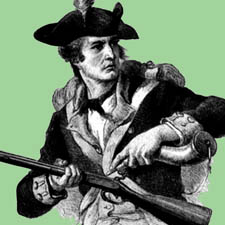| Nathaniel Folsom |

NH FRAMERS OF FREEDOM
This portrait is imagined. We have no image of this New Hampshire hero who began as a British Ranger and became a Revolutionary. Folson, of Exeter, NH, joined the 1774 New Castle raid and never looked back. His brother Sam Folson’s tavern still stands, while Nathaniel went on to become a NH supreme court justice in the new United States.
Early Days
Nathaniel Folsom, born in 1726. was the great-grandson of John and Mary Folsom, who immigrated to America in 1638. Nathaniel was only 14 when his father died. His business life began early with an interest in the lumber field and continued sporadically throughout his life.
In 1761 he formed a partnership with his neighbors, the brothers Joseph and Josiah Gilman. "Folsom, Gilman and Gilman" proposed "to keep a general store on a large scale, to build ships, and to carry on foreign commerce." Though the firm lasted only seven years Nathaniel continued in commerce well after that period.
Ranger to Revolutionary
As a young man, Nathaniel Folsom took military training, according to the custom of the time. In 1755, on the Crown Point Expedition of the French and Indian Wars, he commanded one of ten companies which marched through the woods to Albany and on to Fort Edward. His troops, well versed in ranger tactics, surprised the French troops of Baron Dieskau and, with the loss of only six men, dispersed the enemy and seized their baggage and ammunition.
Folsom went on to become a colonel in the New Hampshire militia under Royal Governor John Wentworth. His royal commission was revoked when, following the raids at Fort William and Mary in December of 1774, he gathered his troops and marched to Portsmouth to guard the captured cannon and small arms until they could be transported up river to Durham.
He was active in town affairs, too, serving as town meeting moderator and as a delegate to the first Provincial Congress, which met in Exeter on July 21, 1774. This group elected him as one of two delegates to represent New Hampshire at the First Continental Congress in Philadelphia. He was elected to this post two times more in subsequent years, and Exeter continued to send him to the Provincial Congresses.
On May 29, 1775, following the alarm at Lexington and Concord, the New Hampshire Provincial Congress made Folsom commander of the re-organized New Hampshire forces. Meanwhile John Stark, who was at Cambridge with the New Hampshire men, had been named to the same post by the Massachusetts Provincial Congress! This conflict endured until the Continental Army was formed several months later, at which time a third man, John Sullivan of Durham, was appointed to command the New Hampshire forces. Folsom remained commander of troops within New Hampshire, tending to the recruitment of men and the gathering of supplies.
Promotion To Chief Justice
In May, 1775, Folsom was appointed to the New Hampshire Committee of Safety. He became a close political associate of Weare, Peabody and Bartlett. The following January he was elected second justice of the Court of Common Pleas for Rockingham County. When the state constitution was adopted in 1783, he was promoted to chief justice, a post he held until his death on May 26, 1790.
Folsom served in several of the State Constitutional Conventions. Elected president pro tempore of the last Constitutional Convention he had the honor of signing the announcement of the adoption of this Constitution in 1783. It is interesting that Folsom was a member of the Constitutional Conventions, for one of the problems this body sought to correct was the plurality of offices held by one man!
Nathaniel Folsom lived to see the country his grandparents had hewn from the wilderness become an independent nation, and died knowing he had taken an active part in shaping her future.
OUTSIDE LINKS
-- Folsom Tavern at American Independence Museum in Exeter, NH
-- Info at US Congress web site with very short bio
Essay by Nancy Merrill. Originally published in "NH: Years of Revolution," Profiles Publications and the NH Bicentennial Commision, 1976. Reprinted by permission of the publisher. Originally appeared online here in 1997. Reprinted in 2006 by SeaocastNH.com
